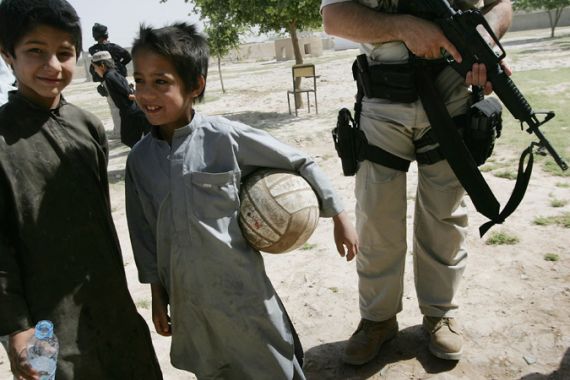Security ban ‘hits Afghan projects’
Several NGOs said to be considering leaving country as impending ban on most private security contractors draws nearer.

 |
|
Following the ban, NGOs will have to rely on Afghan troops and policemen for security [GALLO/GETTY] |
A government ban on private security forces set to begin by the end of the year, has begun to drive foreign aid projects out of Afghanistan, according to reports in US newspapers.
Contractors are used widely throughout the country, not only to protect military bases and embassies but also hundreds of reconstruction projects.
Several US-funded development firms are said to be drawing up plans to abandon the country following the decree issued in August by Hamid Karzai, the Afghan president.
“If these projects grind to a halt, we might as well go home,” one US official told the Washington Post. “They are essential to the counterinsurgency strategy”.
Another US official told the Post that the ban would affect around $1.5bn in reconstruction work and eliminate jobs for 20,000 Afghans in road-building and energy sectors alone.
“If we don’t have private security, we cannot operate in Afghanistan,” the executive of one development firm, speaking anonymously, told the newspaper.
Destabilising force
Karzai and others in his government have criticised private security firms, saying they represent a destabilising force in the country and are responsible for unaccountable acts of violence and abuses of power.
But international military forces and civilians working in the country, distrustful of the nascent Afghan army and police, often rely on them for security and are usually required to retain them by insurance companies.
Development Alternatives International (DAI), a worldwide consulting business that carries out contracts in Afghanistan for the US Agency for International Development (USAID), told the Wall Street Journal that it is “planning for early close-down” of its local governance and community development projects because of the impending ban.
USAID spent around $9.8bn in Afghanistan between 2002 and 2009 and expects to spend $4.2bn this year, which represents a quarter of Afghanistan’s gross domestic product, according to the journal.
On Sunday, Karzai stepped back from the original terms of his decree, saying that private security guards will still be allowed to protect “embassies, transport of diplomats, diplomatic residences, international forces’ bases and depots”.
But he has not made an exception to allow the guards to keep working for Non-Governmental Organisations (NGOs) and development firms.
“We hope that our international friends will not get back to us or try to put pressure on us or talk about it in the media because none of these are going to work,” he told reporters on Wednesday.
“These companies are closed, that is it”.
It is estimated that around 30,000 to 40,000 people are employed in the private security industry in Afghanistan, half of whom are Afghans.
Concrete numbers are hard to find, but studies have estimated the industry generates anywhere from $20bn to $100bn in revenue every year.
Afghanistan analysts doubt that a complete dissolution of all private security companies could take place by the end of December.